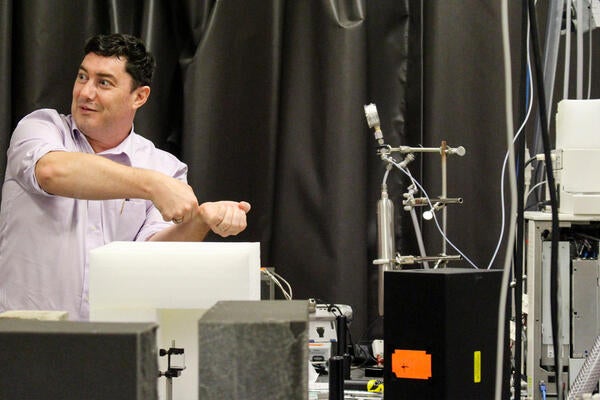
Automating routine health care tasks through robotics takes another decisive step forward
New funding accelerates the deployment of Cobionix’s medical robotics platform across North America and the UK

New funding accelerates the deployment of Cobionix’s medical robotics platform across North America and the UK
By Jordan Flemming University RelationsCobionix, a pioneer in autonomous medical robotics, has secured $3 million in new strategic funding from venture capital firm TitletownTech. The firm, whose backers include Microsoft and the Green Bay Packers, specializes in digital health, agriculture, manufacturing, logistics and entertainment.
“Our relationship with TitletownTech started when they recognized the potential of our platform through our published content and saw how it could help address shortcomings in the health sector while giving health-care providers more time with patients,” says Nima Zamani (BASc ’14, MASc ’18), Waterloo alumni and co-founder of Cobionix.
Zamani along with Dr. Tim Lasswell (BASc ’14, MASc ’17) and John Van Leeuwen (BSc ’81) co-founded Cobionix to optimize health care through autonomous collaborative robots.

Cobionix’s flagship collaborative robot, CODI®, is specifically designed for tele-assisted ultrasound procedures, helping to address labour shortages in the health-care system. “We want to ensure that even the smallest details enhance patient experience while delivering high-quality medical care,” Zamani explains.
This innovative solution seeks to provide a much-needed resource for overburdened health-care providers, especially in rural, remote or underserved areas. Better access to health-care services through automation reduces the need for patients to travel long distances for essential care.
Cobionix is conducting research and clinical pilot phases of CODI® under careful supervision at Saskatoon’s Virtual Health Hub, which helps adopt and deliver health-care services to remote communities. “Instead of patients driving long distances to big cities, they can stay in their small towns and receive quality care,” Zamani says.
The University of Waterloo and Velocity played a significant role in helping the co-founders build their company. Velocity provided essential resources including space, mentorship and guidance on how to start a company and raise funds.
Velocity has been the centre of the University’s entrepreneurship ecosystem since 2008, launching more than 500 companies and cumulatively creating $40 billion in enterprise value.
The new strategic funding from TitletownTech will support accelerating pilot studies and trials of CODI® in Canada, the United States and United Kingdom.
“This funding will also help us deploy more CODI®’s across health-care systems," says Matthew Sefati (BSc '16), Cobionix’s CEO. “With our partnership with TitletownTech, we’ll be able to build new connections and navigate regulatory approvals more efficiently, allowing us to bring CODI® to market faster."
One of the important connections through TitletownTech is Prevea Health, a health-care provider that operates more than 70 facilities in across Wisconsin.
According to Zamani, the hardware provides a strong foundation and their engineers are turning their attention to the coding required to allow for the deployment of autonomous solutions through AI. “CODI® has several use cases including ergonomic support for practitioners to reduce injuries (and free them up to do other tasks), tele-robotics to address geographic barriers and fully automating certain procedures like ultrasound exams.”
CODI®’s physical design allows for rapid adaptation to various clinical tasks with the intent of reducing the burden on health care workers.
“We’ve been hearing a lot of positive feedback from our pilot partners,” Sefati says. “They’re excited to deploy as many CODI® units as possible to help health-care workers do more with less and continue delivering exceptional care despite resource constraints.”
Over the coming months and years, Cobionix will continue its efforts in improving patient care through solutions that also alleviate the pressures on health-care providers.
“We intend to stay laser focused on getting CODI® to market, through regulatory approvals while slowly adding more non-invasive applications to what CODI® is capable of to ensure it becomes more integrated into health care settings,” Zamani says.
Cobionix’s momentum continues to build as it sets its sights on a bright future where cutting-edge robotic solutions work alongside health care providers to ensure the best care and outcomes for patients.

Read more
Upskilling health professionals on AI’s benefits improves efficiencies while maintaining the irreplaceable human connection in care settings

Read more
Waterloo’s new Free Electron Laser will reveal hidden details in biological samples, enhancing our understanding of treatments and therapies

Read more
Using menstrual products as a diagnostic tool could replace invasive Pap smears with a non-invasive alternative
The University of Waterloo acknowledges that much of our work takes place on the traditional territory of the Neutral, Anishinaabeg, and Haudenosaunee peoples. Our main campus is situated on the Haldimand Tract, the land granted to the Six Nations that includes six miles on each side of the Grand River. Our active work toward reconciliation takes place across our campuses through research, learning, teaching, and community building, and is co-ordinated within the Office of Indigenous Relations.